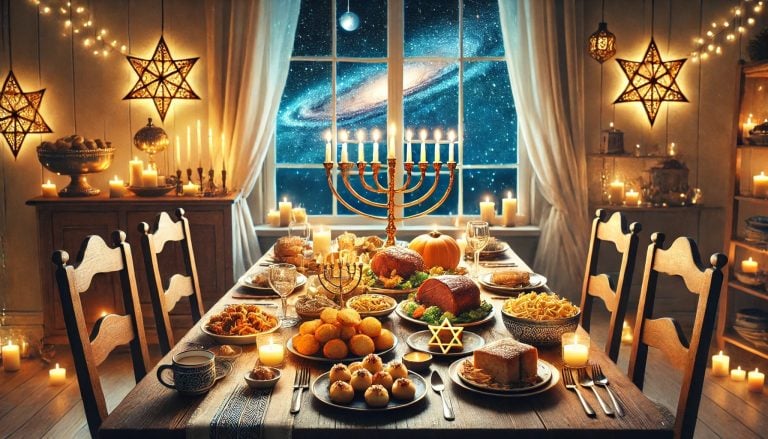
Hanukkah, the Festival of Lights, is a time for reflection, celebration, and family connection. Central to its observance are cherished traditions, particularly the preparation and enjoyment of delicious foods. These dishes carry historical and symbolic significance, preserving the rich heritage of Hanukkah while uniting families around the table. In this blog, we’ll explore the traditional foods of Hanukkah, their role in family gatherings, and the profound connection between the season of giving and the stars above.
Traditional Hanukkah Foods: A Taste of History
Hanukkah foods are deeply rooted in the history of the Jewish people and the miracle of the oil. The story recounts how a small amount of sacred oil, enough for just one day, miraculously burned for eight days in the rededicated Temple. This miracle inspired the culinary focus on oil-based foods during Hanukkah, particularly fried delights such as:
- Latkes: These crispy, golden treats are perhaps the most iconic Hanukkah food. Made from grated potatoes, onions, and eggs, latkes are fried in oil, symbolizing the miracle of the oil. They’re often served with applesauce or sour cream and are a favorite for both kids and adults.
- Sufganiyot: Another popular treat, sufganiyot are deep-fried doughnuts filled with sweet jelly and dusted with powdered sugar. These sugary delights are a modern addition to the Hanukkah table but have quickly become a beloved staple.
- Brisket and Kugel: While fried foods dominate, traditional Jewish comfort dishes like slow-cooked brisket and noodle kugel are also enjoyed, bringing warmth to the holiday table.
How Hanukkah Foods Bring Families Together
Food has always been a powerful way to bring people closer, and during Hanukkah, it becomes a central part of family celebrations. Preparing latkes, sufganiyot, and other traditional dishes often involves multiple generations working together in the kitchen, sharing recipes and stories.
The communal nature of Hanukkah meals extends beyond the table. Families and friends gather to light the menorah, exchange gifts, play dreidel, and share blessings. The delicious smells of frying latkes and baking challah fill the home with a sense of togetherness and joy, reinforcing the bonds between loved ones.

The Season of Giving: Stars and Hanukkah’s Connection to the Cosmos
Hanukkah is a season of giving and gratitude, a time to reflect on the miracles and blessings in life. The symbolism of light plays a significant role, connecting the festival to the stars that illuminate the night sky. Stars hold profound meaning in Jewish culture, representing divine presence and guidance, much like the menorah’s light.
This connection to the stars makes dedicating a star through International Star Registry an ideal holiday gift idea. Just as Hanukkah celebrates light and miracles, naming a star for someone special honors their unique brilliance in your life. The star becomes a lasting reminder of the holiday’s meaning and a thoughtful way to celebrate the season of giving.
The Significance of Stars in Hanukkah Traditions
Stars have long been a source of inspiration and navigation for humanity, and their symbolism aligns beautifully with Hanukkah. In Jewish tradition, stars are seen as part of God’s creation, reflecting the vastness and wonder of the universe. The lights of the menorah mirror the stars in the sky, symbolizing hope, renewal, and the eternal presence of divine miracles.
By choosing to dedicate a star, you’re not only celebrating Hanukkah’s theme of light but also creating a timeless bond between tradition and the cosmos. This heartfelt gesture is more than a gift; it’s a way to connect with loved ones while honoring the celestial significance of the holiday.
FAQ About Hanukkah Foods and Traditions
Q: Why are fried foods so important during Hanukkah?
A: Fried foods like latkes and sufganiyot are central to Hanukkah because they symbolize the miracle of the oil, which burned for eight days in the rededicated Temple despite being enough for only one day.
Q: What is the significance of lighting the menorah?
A: Lighting the menorah commemorates the miracle of the oil and serves as a reminder of resilience, faith, and divine blessings. Each night, an additional candle is lit, culminating in all eight candles glowing brightly on the final night.
Q: How do Hanukkah traditions bring families closer?
A: Hanukkah traditions, such as cooking together, playing dreidel, and sharing meals, foster a sense of togetherness and create lasting memories for families and friends.
Q: Why are stars meaningful during Hanukkah?
A: Stars symbolize guidance, light, and the divine in Jewish tradition, echoing the themes of Hanukkah. The menorah’s light and the stars in the sky both serve as reminders of miracles and hope.
Q: How does International Star Registry relate to Hanukkah?
A: Naming a star through International Star Registry aligns beautifully with Hanukkah’s focus on light and miracles. It’s a unique holiday gift idea that honors the recipient’s place in your life while celebrating the season’s celestial connection.
Conclusion
Hanukkah is a time to honor tradition, celebrate miracles, and cherish family. Through the preparation of traditional foods and the lighting of the menorah, this festival illuminates homes and hearts alike. By connecting the holiday to the stars above, we deepen our appreciation for the wonders of the universe and the bonds that bring us together.
This Hanukkah, consider dedicating a star as a meaningful way to celebrate the Festival of Lights. It’s a gesture that captures the holiday’s essence—light, hope, and the enduring power of giving.
